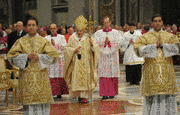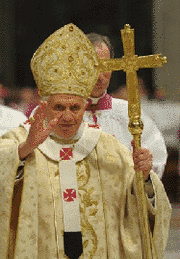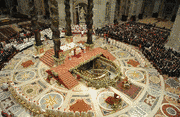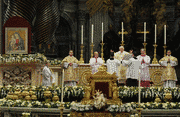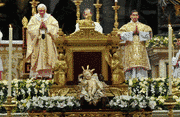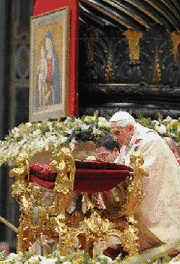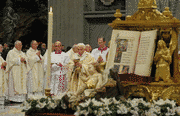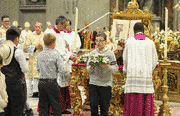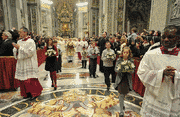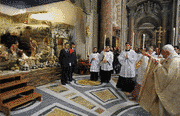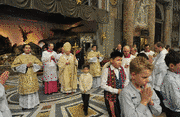Christmas - Natale - Navidad - Noël 2010
Pope Benedict XVI's Homily at Midnight Mass
- in English, French, German, Italian, Portuguese & Spanish
"Dear Brothers and Sisters!
You are my son, this day I have begotten you” – with this passage from Psalm 2 the Church begins the liturgy of this holy night. She knows that this passage originally formed part of the coronation rite of the kings of Israel. The king, who in himself is a man like others, becomes the “Son of God” through being called and installed in his office. It is a kind of adoption by God, a decisive act by which he grants a new existence to this man, drawing him into his own being. The reading from the prophet Isaiah that we have just heard presents the same process even more clearly in a situation of hardship and danger for Israel: “To us a child is born, to us a son is given. The government will be upon his shoulder” (Is 9:6). Installation in the office of king is like a second birth. As one newly born through God’s personal choice, as a child born of God, the king embodies hope. On his shoulders the future rests. He is the bearer of the promise of peace. On that night in Bethlehem this prophetic saying came true in a way that would still have been unimaginable at the time of Isaiah. Yes indeed, now it really is a child on whose shoulders government is laid. In him the new kingship appears that God establishes in the world. This child is truly born of God. It is God’s eternal Word that unites humanity with divinity. To this child belong those titles of honour which Isaiah’s coronation song attributes to him: Wonderful Counsellor, Mighty God, Everlasting Father, Prince of Peace (Is 9:6). Yes, this king does not need counsellors drawn from the wise of this world. He bears in himself God’s wisdom and God’s counsel. In the weakness of infancy, he is the mighty God and he shows us God’s own might in contrast to the self-asserting powers of this world.
Truly, the words of Israel’s coronation rite were only ever rites of hope which looked ahead to a distant future that God would bestow. None of the kings who were greeted in this way lived up to the sublime content of these words. In all of them, those words about divine sonship, about installation into the heritage of the peoples, about making the ends of the earth their possession (Ps 2:8) were only pointers towards what was to come – as it were signposts of hope indicating a future that at that moment was still beyond comprehension. Thus the fulfilment of the prophecy, which began that night in Bethlehem, is both infinitely greater and in worldly terms smaller than the prophecy itself might lead one to imagine. It is greater in the sense that this child is truly the Son of God, truly “God from God, light from light, begotten not made, of one being with the Father”. The infinite distance between God and man is overcome. God has not only bent down, as we read in the Psalms; he has truly “come down”, he has come into the world, he has become one of us, in order to draw all of us to himself. This child is truly Emmanuel – God-with-us. His kingdom truly stretches to the ends of the earth. He has truly built islands of peace in the world-encompassing breadth of the holy Eucharist. Wherever it is celebrated, an island of peace arises, of God’s own peace. This child has ignited the light of goodness in men and has given them strength to overcome the tyranny of might. This child builds his kingdom in every generation from within, from the heart. But at the same time it is true that the “rod of his oppressor” is not yet broken, the boots of warriors continue to tramp and the “garment rolled in blood” (Is 9:4f) still remains. So part of this night is simply joy at God’s closeness. We are grateful that God gives himself into our hands as a child, begging as it were for our love, implanting his peace in our hearts. But this joy is also a prayer: Lord, make your promise come fully true. Break the rods of the oppressors. Burn the tramping boots. Let the time of the garments rolled in blood come to an end. Fulfil the prophecy that “of peace there will be no end” (Is 9:7). We thank you for your goodness, but we also ask you to show forth your power. Establish the dominion of your truth and your love in the world – the “kingdom of righteousness, love and peace”.
“Mary gave birth to her first-born son” (Lk 2:7). In this sentence St Luke recounts quite soberly the great event to which the prophecies from Israel’s history had pointed. Luke calls the child the “first-born”. In the language which developed within the sacred Scripture of the Old Covenant, “first-born” does not mean the first of a series of children. The word “first-born” is a title of honour, quite independently of whether other brothers and sisters follow or not. So Israel is designated by God in the Book of Exodus (4:22) as “my first-born Son”, and this expresses Israel’s election, its singular dignity, the particular love of God the Father. The early Church knew that in Jesus this saying had acquired a new depth, that the promises made to Israel were summed up in him. Thus the Letter to the Hebrews calls Jesus “the first-born”, simply in order to designate him as the Son sent into the world by God after the ground had been prepared by Old Testament prophecy. The first-born belongs to God in a special way – and therefore he had to be handed over to God in a special way – as in many religions – and he had to be ransomed through a vicarious sacrifice, as St Luke recounts in the episode of the Presentation in the Temple. The first-born belongs to God in a special way, and is as it were destined for sacrifice. In Jesus’ sacrifice on the Cross this destiny of the first-born is fulfilled in a unique way. In his person he brings humanity before God and unites man with God in such a way that God becomes all in all. St Paul amplified and deepened the idea of Jesus as first-born in the Letters to the Colossians and to the Ephesians: Jesus, we read in these letters, is the first-born of all creation – the true prototype of man, according to which God formed the human creature. Man can be the image of God because Jesus is both God and man, the true image of God and of man. Furthermore, as these letters tell us, he is the first-born from the dead. In the resurrection he has broken down the wall of death for all of us. He has opened up to man the dimension of eternal life in fellowship with God. Finally, it is said to us that he is the first-born of many brothers. Yes indeed, now he really is the first of a series of brothers and sisters: the first, that is, who opens up for us the possibility of communing with God. He creates true brotherhood – not the kind defiled by sin as in the case of Cain and Abel, or Romulus and Remus, but the new brotherhood in which we are God’s own family. This new family of God begins at the moment when Mary wraps her first-born in swaddling clothes and lays him in a manger. Let us pray to him: Lord Jesus, who wanted to be born as the first of many brothers and sisters, grant us the grace of true brotherhood. Help us to become like you. Help us to recognize your face in others who need our assistance, in those who are suffering or forsaken, in all people, and help us to live together with you as brothers and sisters, so as to become one family, your family.
At the end of the Christmas Gospel, we are told that a great heavenly host of angels praised God and said: “Glory to God in the highest and on earth peace among men with whom he is pleased!” (Lk 2:14). The Church, in the Gloria, has extended this song of praise, which the angels sang in response to the event of the holy night, into a hymn of joy at God’s glory – “we praise you for your glory”. We praise you for the beauty, for the greatness, for your goodness, which becomes visible to us this night. The appearing of beauty, of the beautiful, makes us happy without our having to ask what use it can serve. God’s glory, from which all beauty derives, causes us to break out in astonishment and joy. Anyone who catches a glimpse of God experiences joy, and on this night we see something of his light. But the angels’ message on that holy night also spoke of men: “Peace among men with whom he is pleased”. The Latin translation of the angels’ song that we use in the liturgy, taken from Saint Jerome, is slightly different: “peace to men of good will”. The expression “men of good will” has become an important part of the Church’s vocabulary in recent decades. But which is the correct translation? We must read both texts together; only in this way do we truly understand the angels’ song. It would be a false interpretation to see this exclusively as the action of God, as if he had not called man to a free response of love. But it would be equally mistaken to adopt a moralizing interpretation as if man were so to speak able to redeem himself by his good will. Both elements belong together: grace and freedom, God’s prior love for us, without which we could not love him, and the response that he awaits from us, the response that he asks for so palpably through the birth of his son. We cannot divide up into independent entities the interplay of grace and freedom, or the interplay of call and response. The two are inseparably woven together. So this part of the angels’ message is both promise and call at the same time. God has anticipated us with the gift of his Son. God anticipates us again and again in unexpected ways. He does not cease to search for us, to raise us up as often as we might need. He does not abandon the lost sheep in the wilderness into which it had strayed. God does not allow himself to be confounded by our sin. Again and again he begins afresh with us. But he is still waiting for us to join him in love. He loves us, so that we too may become people who love, so that there may be peace on earth.
Saint Luke does not say that the angels sang. He states quite soberly: the heavenly host praised God and said: “Glory to God in the highest” (Lk 2:13f). But men have always known that the speech of angels is different from human speech, and that above all on this night of joyful proclamation it was in song that they extolled God’s heavenly glory. So this angelic song has been recognized from the earliest days as music proceeding from God, indeed, as an invitation to join in the singing with hearts filled with joy at the fact that we are loved by God. Cantare amantis est, says St Augustine: singing belongs to one who loves. Thus, down the centuries, the angels’ song has again and again become a song of love and joy, a song of those who love. At this hour, full of thankfulness, we join in the singing of all the centuries, singing that unites heaven and earth, angels and men. Yes, indeed, we praise you for your glory. We praise you for your love. Grant that we may join with you in love more and more and thus become people of peace. Amen."
BXVI - St Peter's Basiilica, the Vatican, 24 December 2010
Papa Benedetto's Urbi et Orbi Blessing
- in Croatian, English, French, German, Italian, Polish, Portuguese & Spanish
“Verbum caro factum est” – “The Word became flesh” (Jn 1:14).
"Dear brothers and sisters listening to me here in Rome and throughout the world, I joyfully proclaim the message of Christmas: God became man; he came to dwell among us. God is not distant: he is “Emmanuel”, God-with-us. He is no stranger: he has a face, the face of Jesus.
This is a message ever new, ever surprising, for it surpasses even our most daring hope. First of all, because it is not merely a proclamation: it is an event, a happening, which credible witnesses saw, heard and touched in the person of Jesus of Nazareth! Being in his presence, observing his works and hearing his words, they recognized in Jesus the Messiah; and seeing him risen, after his crucifixion, they were certain that he was true man and true God, the only-begotten Son come from the Father, full of grace and truth.
“The Word became flesh”. Before this revelation we once more wonder: how can this be? The Word and the flesh are mutually opposed realities; how can the eternal and almighty Word become a frail and mortal man? There is only one answer: Love. Those who love desire to share with the beloved, they want to be one with the beloved, and Sacred Scripture shows us the great love story of God for his people which culminated in Jesus Christ.
God in fact does not change: he is faithful to himself. He who created the world is the same one who called Abraham and revealed his name to Moses: “I am who I am … the God of Abraham, Isaac and Jacob … a God merciful and gracious, abounding in steadfast love and faithfulness (cf Ex 3:14-15; 34:6). God does not change; he is Love, ever and always. In himself he is communion, unity in Trinity, and all his words and works are directed to communion. The Incarnation is the culmination of creation. When Jesus, the Son of God incarnate, was formed in the womb of Mary by the will of the Father and the working of the Holy Spirit, creation reached its high point. The ordering principle of the universe, the Logos, began to exist in the world, in a certain time and space.
“The Word became flesh”. The light of this truth is revealed to those who receive it in faith, for it is a mystery of love. Only those who are open to love are enveloped in the light of Christmas. So it was on that night in Bethlehem, and so it is today. The Incarnation of the Son of God is an event which occurred within history, while at the same time transcending history. In the night of the world a new light was kindled, one which lets itself be seen by the simple eyes of faith, by the meek and humble hearts of those who await the Saviour. If the truth were a mere mathematical formula, in some sense it would impose itself by its own power. But if Truth is Love, it calls for faith, for the “yes” of our hearts.
And what do our hearts, in effect, seek, if not a Truth which is also Love? Children seek it with their questions, so disarming and stimulating; young people seek it in their eagerness to discover the deepest meaning of their life; adults seek it in order to guide and sustain their commitments in the family and the workplace; the elderly seek it in order to grant completion to their earthly existence.
“The Word became flesh”. The proclamation of Christmas is also a light for all peoples, for the collective journey of humanity. “Emmanuel”, God-with-us, has come as King of justice and peace. We know that his Kingdom is not of this world, and yet it is more important than all the kingdoms of this world. It is like the leaven of humanity: were it lacking, the energy to work for true development would flag: the impulse to work together for the common good, in the disinterested service of our neighbour, in the peaceful struggle for justice. Belief in the God who desired to share in our history constantly encourages us in our own commitment to that history, for all its contradictions. It is a source of hope for everyone whose dignity is offended and violated, since the one born in Bethlehem came to set every man and woman free from the source of all enslavement.
May the light of Christmas shine forth anew in the Land where Jesus was born, and inspire Israelis and Palestinians to strive for a just and peaceful coexistence. May the comforting message of the coming of Emmanuel ease the pain and bring consolation amid their trials to the beloved Christian communities in Iraq and throughout the Middle East; may it bring them comfort and hope for the future and bring the leaders of nations to show them effective solidarity. May it also be so for those in Haiti who still suffer in the aftermath of the devastating earthquake and the recent cholera epidemic. May the same hold true not only for those in Colombia and Venezuela, but also in Guatemala and Costa Rica, who recently suffered natural disasters.
May the birth of the Saviour open horizons of lasting peace and authentic progress for the peoples of Somalia, Darfur and Côte d’Ivoire; may it promote political and social stability in Madagascar; may it bring security and respect for human rights in Afghanistan and in Pakistan; may it encourage dialogue between Nicaragua and Costa Rica; and may it advance reconciliation on the Korean peninsula. May the birth of the Saviour strengthen the spirit of faith, patience and courage of the faithful of the Church in mainland China, that they may not lose heart through the limitations imposed on their freedom of religion and conscience but, persevering in fidelity to Christ and his Church, may keep alive the flame of hope. May the love of “God-with-us” grant perseverance to all those Christian communities enduring discrimination and persecution, and inspire political and religious leaders to be committed to full respect for the religious freedom of all.
Dear brothers and sisters, “the Word became flesh”; he came to dwell among us; he is Emmanuel, the God who became close to us. Together let us contemplate this great mystery of love; let our hearts be filled with the light which shines in the stable of Bethlehem! To everyone, a Merry Christmas!"
St Peter's Square, 25th December 2010
Catechesis by Papa Benedict XVI
General Audience, Wednesday 22 December 2010 - in Croatian, English, French, German, Italian, Portuguese & Spanish
"Dear Brothers and Sisters,
With this last Audience before the Christmas celebrations, we approach with trepidation and wonder the “place” where for us and for our salvation everything began, everything found fulfilment, where the expectations of the world and of the human heart converged with God’s presence.
We can already have a foretaste of joy now, brought by that small light which is glimpsed, which begins to shine out on the world from the Bethlehem grotto. During the Advent journey the Liturgy has invited us to live, we have been shown how to welcome with readiness and gratitude the great event of the Saviour’s birth and to contemplate full of wonder his entry into the world. Joyful expectation, characteristic of the days that lead up to Holy Christmas, is certainly the fundamental attitude of the Christian who wishes to live fruitfully the renewed encounter with the One who comes to dwell among us: Jesus Christ, the Son of God made man. Let us rediscover and make our own the disposition of heart of those who were the first to welcome the coming of the Messiah: Zachariah and Elizabeth, the shepherds, the simple people and, especially, Mary and Joseph, who felt trepidation personally, but above all rejoiced in the mystery of this birth. The whole of the Old Testament constitutes one great promise that was to be fulfilled with the coming of a powerful Saviour. The Book of the Prophet Isaiah in particular— testifies to the anguish of history and of the whole of creation oriented to a redemption destined to bring fresh energy and give a new orientation to the entire world. Hence down the centuries, alongside the expectation of the figures of Sacred Scripture our expectation, which we are experiencing in these days and which keeps us alert throughout our life journey, also finds room and meaning. Indeed, the whole of human life is enlivened by this profound sentiment, by the desire that what is the truest, the most beautiful and the greatest, which we have perceived and intuited with mind and heart, may come to meet us in order that it become real before our eyes and uplift us anew.
“Soon the Lord God will come, and you will call him Emmanuel, God-with-us” (Entrance Antiphon, Holy Mass of 21 December). We frequently repeat these words in these days. In Liturgical time, which reactualizes the Mystery, the One who comes to save us from sin and death is already at the door, the One who, after the disobedience of Adam and Eve, embraces us once again and opens wide to us the way to true life. St Irenaeus explains it in his treatise Adversus Haereses [Against Heresies]”, when he says: “The Son of God himself descended ‘in the likeness of sinful flesh’ (Rom 8:3) to condemn sin and, having condemned it, to cast it out completely from the human race. He called man to likeness with himself, he made him imitator of God, he set him on the path indicated by the Father so that he might see God, and he gave him as a gift the Father himself” (III, 20, 2-3).
Some of St Irenaeus’ favourite ideas are presented to us, for example, that God with the Child Jesus calls us to likeness with himself. We see how God is. And thus St Irenaeus reminds us that we should be like God and must imitate him. God gave himself. God gave himself into our hands. We must imitate God. And lastly, is the thought that in this way we can see God. One central idea of St Irenaeus is that man does not see God, he cannot see him and so he is in the dark concerning the truth about himself. However man, who cannot see God, can see Jesus and so he sees God, so he begins to see the truth and so he begins to live.
The Saviour, therefore, comes to reduce to powerlessness the work of evil and all that can still keep us distant from God in order to restore to us the ancient splendour and primitive fatherhood. With his coming among us, God points out and assigns to us a task: precisely that of being like him and of striving for true life, to attain the vision of God in the Face of Christ. St. Irenaeus states further: “The Word of God dwelt in man and became the Son of man in order to accustom man to perceive God and to accustom God to dwell in man, according to the Father's pleasure. For this reason God gave us as a ‘sign’ of our salvation the One who, born of the Virgin, is the Emmanuel” (ibid.). Here too there is a very beautiful central idea of St Irenaeus: We must get used to perceiving God. God is generally remote from our lives, from our ideas, from our actions. He has come to us and we must accustom ourselves to being with God. And Irenaeus dares boldly to say that God must also accustom himself to being with us and within us. And that God should perhaps accompany us at Christmas, should accustom us to God, just as God should accustom himself to us, to our poverty and frailty. Hence the coming of the Lord can have no other purpose than to teach us to see and love events, the world, and all that surrounds us with God’s own eyes. The Word-become-a-Child helps us to understand God’s way of acting so that we will be able to let ourselves be transformed increasingly by his goodness and his infinite mercy.
In the night of the world let us still be surprised and illumined by this act of God which is totally unexpected: God makes himself a Child. We must let ourselves be overcome with wonder, illumined by the Star that flooded the universe with joy. May the Child Jesus, in coming to us, not find us unprepared, dedicated only to making exterior reality more beautiful. May the care we give to making our roads and homes more splendid be an even greater incentive to predispose our soul to encounter the One who will come to visit us, who is the true beauty and the true light. Let us therefore purify our consciences and our lives of what is contrary to this coming: thoughts, words, attitudes and deeds — impelling ourselves to do good and to contribute to achieving in our world peace and justice for every person, and thus to walk towards our encounter with the Lord.
A characteristic sign of this Christmas Season is the Nativity scene. In St. Peter’s Square too, in keeping with the tradition, it is almost ready and looks out in spirit over Rome and over the whole world, representing the beauty of the Mystery of God who was made man and pitched his tent among us (cf. John 1:14). The crib is an expression of our expectation that God is coming close to us, that Jesus comes close to us, but it is also an expression of thanksgiving for the One who decided to share in our human condition, in poverty and simplicity. I am glad because the tradition of preparing the crib in homes, in workplaces, in meeting places, is still alive and is even being rediscovered. Today too, may this genuine witness of Christian faith also be able to offer all men and women of good will an eloquent icon of the Father’s infinite love for us all. May the hearts of children and adults still be able to feel wonder before him.
Dear brothers and sisters, may the Virgin Mary and St Joseph help us to live the Mystery of Christmas with renewed gratitude to the Lord. In the midst of the frenetic activity of our day, may this Season give us some calm and joy and enable us to feel tangibly the goodness of our God, who became a Child to save us and to give new encouragement and light on our journey. This is my wish for a holy and happy Christmas: I address it with affection to all of you present here, to your families, in particular to the sick and the suffering, as well as to your communities and your loved ones."
Saluti:
"Je salue cordialement les pèlerins francophones, en particulier les étudiants de l’enseignement catholique de la région de Lyon, ainsi que la délégation de la Croix-Rouge française et les missionnaires de la divine Miséricorde accompagnés de Mgr Rey, Évêque de Fréjus-Toulon. Que votre préparation aux fêtes qui approchent ne soit pas seulement matérielle, mais qu’elle soit aussi l’occasion de purifier vos cœurs de tout ce qui les empêche d’accueillir le Sauveur qui vient. Joyeux Noël à tous!
I offer a warm welcome to the English-speaking pilgrims and visitors present at today’s Audience. To all of you, and especially the children, I offer my heartfelt good wishes for a serene and joy-filled Christmas!
Ganz herzlich grüße ich die Pilger und Besucher aus den Ländern deutscher Sprache. Wir freuen uns über den weihnachtlichen Schmuck in unseren Städten und Häusern. Aber lassen wir das nicht Äußerlichkeit sein, die veräußerlicht, sondern bereiten wir uns inwendig für die Schönheit Gottes, versuchen wir inwendig uns zu reinigen, so daß Gott in uns Platz finden kann. Der Herr segne euch alle und schenke euch allen ein gnadenreiches Weihnachtsfest.
Saludo a los grupos de lengua española, en particular a los peregrinos de Alange y Córdoba, así como a los demás fieles provenientes de España, México y otros países latinoamericanos. Deseo a todos una feliz Navidad y os invito a preparar vuestro corazón para recibir al Niño Jesús. Que la Virgen María y San José nos ayuden a vivir el Misterio de este tiempo santo con renovada gratitud al Señor, ofreciendo a los demás paz y alegría. Muchas gracias.
Amados peregrinos de língua portuguesa, a minha cordial saudação de boas vindas para todos, com votos de um santo Natal, portador das consolações e graças do Deus Menino: nos vossos corações, famílias e comunidades, resplandeça a luz do Salvador, que nos revela o rosto terno e misericordioso do Pai do Céu. Em seu Nome, eu vos abençoo, pedindo a Deus um Ano Novo sereno e feliz para todos.
Serdeczne pozdrowienie kieruję do Polaków. „W tym objawiła się miłość Boga ku nam, że zesłał Syna swego Jednorodzonego na świat, abyśmy życie mieli dzięki Niemu” (1J 4, 9). Życzę wszystkim głębokiego przeżycia świąt Bożego Narodzenia. Osobiste, pełne wiary spotkanie z Chrystusem, wcieloną Miłością Boga, niech budzi nadzieję, daje pokój i radość; niech otwiera serca na światło Ducha Świętego, aby przewodziło w drodze do szczęścia. Niech Bóg wam błogosławi!
* * *
Rivolgo ora un cordiale saluto ai pellegrini di lingua italiana, ricordando, in modo speciale, gli Zampognari di Bojano e la delegazione del Comune di Bolsena.
Desidero, poi, salutare i giovani, i malati e gli sposi novelli. A pochi giorni dalla solennità del Natale, possa l'amore, che Dio manifesta all'umanità nella nascita di Cristo, accrescere in voi, cari giovani, il desiderio di servire generosamente i fratelli. Sia per voi, cari malati, fonte di conforto e di serenità, perché il Signore viene a visitarci, recando consolazione e speranza. Ispiri voi, cari sposi novelli, a consolidare la vostra promessa di amore e di reciproca fedeltà."
© Copyright 2009 - Libreria Editrice Vaticana

